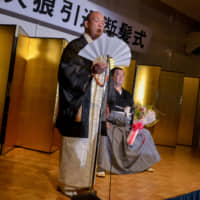Though sumo and song may not seem obvious bedfellows, Japan's national sport has musical connections both varied and historical.
Jinku, a form of folk singing, is a common sight on provincial tours and at retirement ceremonies.
Six wrestlers wearing kesho mawashi (highly decorated apron-like belts) take turns on the microphone in the center of the ring while the others clap and chant along in unison.
The songs themselves usually include verses related to the relevant region that they are passing through, or the rikishi in question who is retiring.
Former maegashira Daishi was so good at jinku that in his post-sumo life, he has been able to maintain a full-time career as a singer.
Likewise, former ozeki Konishiki continues to perform regularly at live events around Japan.
The big Hawaiian was, along with compatriots Akebono and Musashimaru, the subject of legendry singer Israel Kamakawiwo'ole's 1995 song, "Tengoku Kara Kaminari" (Thunder from Heaven).
In days gone by, rikishi didn't even need to wait for retirement to become singers.
Former ozeki Masuiyama released several hit records while still an active rikishi before the Japan Sumo Association eventually clamped down on wrestlers engaging in secondary endeavors.
In 2013, after reaching the retirement age of 65, he left the JSA and restarted his musical career.
Sumo also has its own renseika (training song) that new recruits learn at the sumo school they are obliged to attend after joining the sport.
Like school fight songs, it's often performed at parties or other events.
The Japan Times staff, on a recent visit to Naruto stable, saw former ozeki Kotooshu have his rikishi perform it at the end of a training session.



